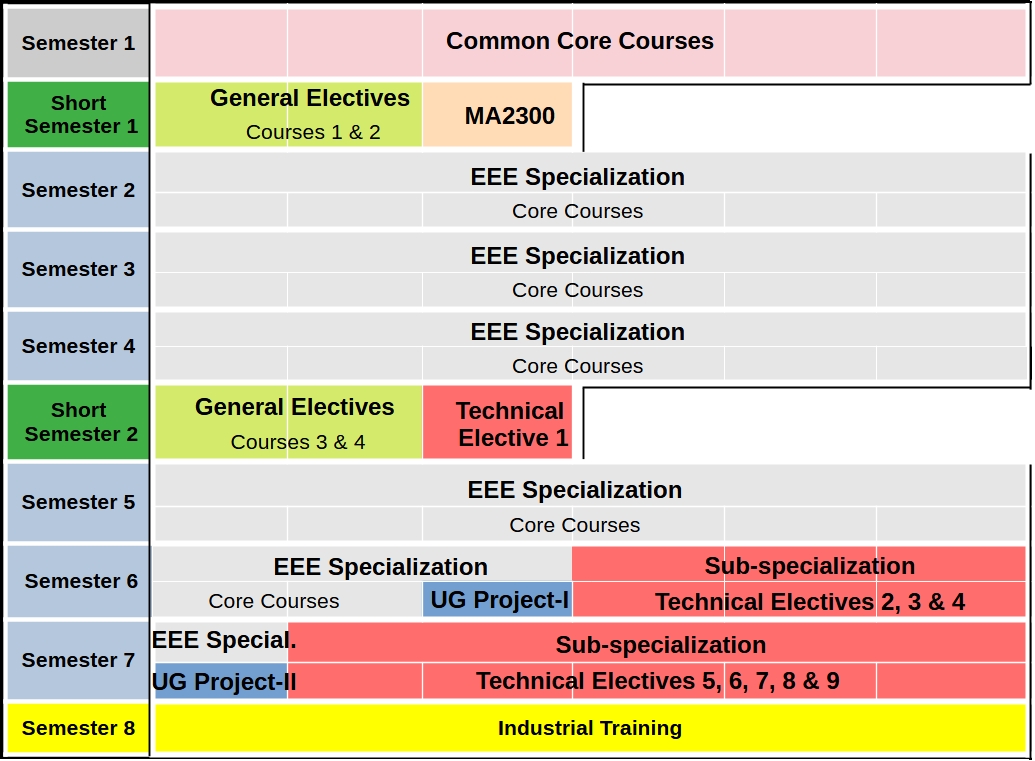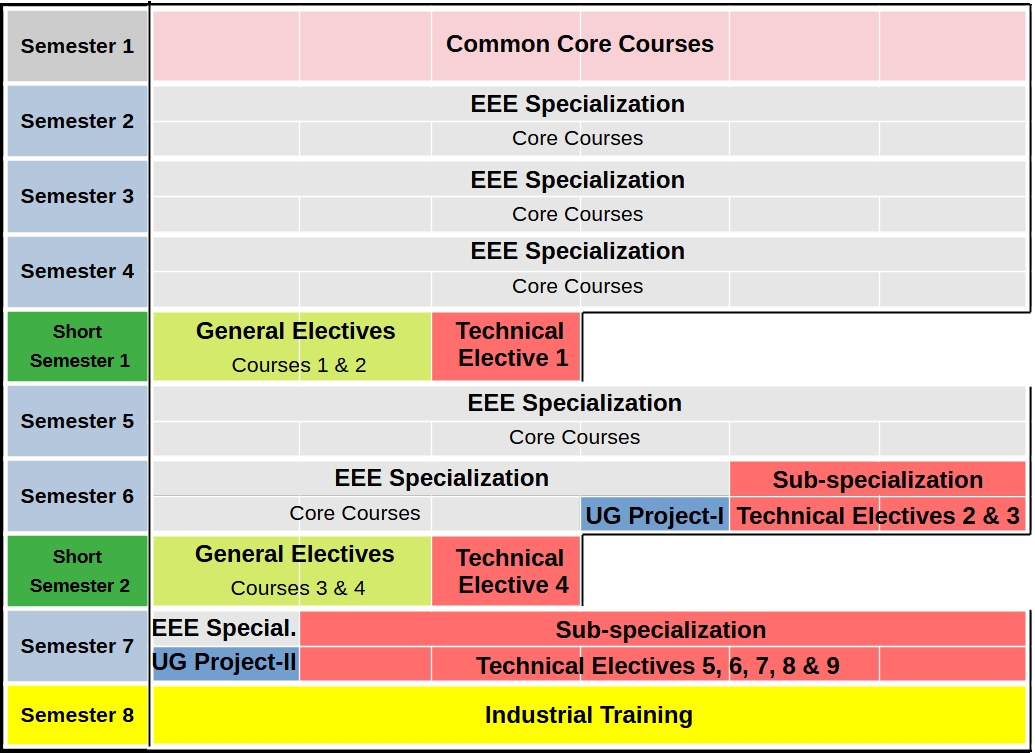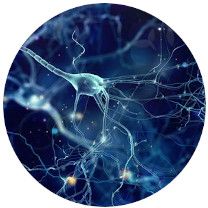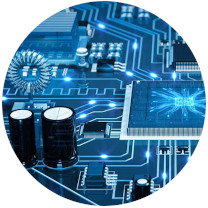Undergraduate Programme
The course in Electrical and Electronic Engineering is designed to equip the student with a sound knowledge and understanding of all the sub-disciplines of electrical and electronic engineering. Further, in-depth, practical knowledge, high degree of analytical skills, ability to handle subject-specific simulation tools, ability to handle software-based applications, sound knowledge in design, and development of the soft skills throughout the degree course provide the best combination for students to graduate as a well-qualified electrical and electronic engineer. In addition, a good grasp of civil and mechanical engineering theory and practice and industrial training is also considered essential.
Graduate Profile
"The Graduate will produce engineering designs that are innovative, based on sound principals, sustainable, environmentally sound, and adhering to the ethical guidelines. He/she will be an effective leader in the chosen career and in the society. The graduate will pursue lifelong learning and be a member and leader of professional organizations"
A detailed GRADUATE PROFILE can be found here.
Programme Structure
The Electrical and Electronic Engineering specialization program is structured in such a way that students can focus on one or more of the following areas as they progress.
|
Artificial Intelligence and Signal Processing (AISP) Biomedical Engineering (BME) Communication and Information Engineering (CIE) Electronics and Instrumentation Engineering (EI) Power High Voltage and Energy Systems Engineering (PHE) Control, Robotics and Automation Engineering (RCA) |
The recommended technical electives are listed here.
The Undergraduate Programme offered by the Department of Electrical and Electronic Engineering,
University of Peradeniya has the following revised structure for the Batch E22:

The Undergraduate Programme offered by the Department of Electrical and Electronic Engineering,
University of Peradeniya has the following revised structure for the Batches E23 Onwards:
The degree program is designed for completion within four academic years. All the semesters, except the two short semesters and the 8th semester, are of 14-week duration (academic work) each. General Electives are covered in each of the short semesters which are of 8-week duration. During the 8th semester, students will undergo Industrial Training. During a single semester, a student can enroll up to 18 credits of courses being offered. The courses are organized at five different levels indicated by the course numbers in 1000, 2000, 3000, 4000 (based on academic year), and 5000 series (elective courses). The technical elective courses are categorized according to the six sub-specializations of the department.
The UG program is separated into two stages: the 1st semester or common core modules (General Program, GP, as previously known) in Engineering covering 1000-level courses and the Specialization Program in Engineering covering some of the 1000-level courses (2nd semester), and the courses 2000 level and above. The General Program is common to all the students entering the Faculty of Engineering. At the end of the 1st semester, students are streamed into specializations based on their academic performance and their personal preferences. Electrical and Electronic Engineering has been one of the most sought-after disciplines among students for many years. Both the Common and Specialization programs have courses with contributions to (i) Mathematics, Basic sciences, and Computing, (ii) Engineering Sciences & Engineering Design: Projects, and (iii) Complementary Studies: Management, Engineering economics, Communications, Humanities & Social sciences, and Engineering ethics.
In the Specialization Program, theory and practice are developed further through lectures, experiments, designs, and project work. Subjects in areas such as electrical measurements, electronics, electrical power, telecommunications, systems & control, electrical machines, power systems, embedded systems, digital systems, and programming are taught as core courses throughout the program. Laboratory work consisting of practical and experimental studies, and design work, relating to the main engineering subjects are undertaken in small groups. For more details on the course structure in the EE Specialization program see below.
In the 2000 level, the Specialization courses provide the essential technical knowledge that electrical and electronic engineers must possess. These also include courses on network analysis, signals and systems, measurements, electronics, electrical power and energy, and programming.
In the 3000 and 4000 levels, students are exposed to analysis and design in order to solve complex engineering problems. Students possess a good understanding of engineering concepts by the time they enter the 4000 level.
The research projects are offered in the 4000 level which is often based on open-ended electrical and electronic engineering problems. Such project activities provide a deep understanding of a subject area meeting the analytical, research, and design interests of the individuals. The students are also given the opportunity to demonstrate their creative abilities while interacting with academic staff via the project study. In addition, the projects will enhance the student’s capability to perform in a group of multi-disciplinary interests where teamwork, leadership, and communication skills are essential.
In addition to the core courses, a wide range of electives are available for students to broaden their outlook. Technical elective courses allow the students to learn to a great depth in specialized areas of interest while General electives enable them to gain a broader perspective of their role as professionals.
Industrial training is given to all undergraduates in their 8th semesters (final year) in general or specialized fields of study. However, in line with the objectives of the Department Career Guidance program, which is to motivate the DEEE students to decide on their career path as early as possible, the department encourages the students to select Industrial Training according to their intended area of focus as the initial step of their career planning process. The total duration of the industrial training is 24 weeks (6 Credits). The industrial training is a compulsory part of an engineering degree program and completion of the industrial training to the satisfaction of the faculty is a requirement for the successful completion of the final course in engineering. If any student fails to meet the required standards in the industrial training program, he/she will be required to undergo further training to be eligible for the award of the degree of Bachelor of the Science of Engineering. The final grade of the industrial training component is included in the academic transcript as well. Read more ...
Credit Requirement of the EEE Specialization

Common Core Modules offered by the Faculty of Engineering
The General/Common Programme in Engineering, which is conducted in the first academic year, is a common program for all the students at the Faculty of Engineering. There are six courses to be completed under the General Programme, which consists of only one semester. Key modules, such as mathematics/calculus, programming, mechanics, and electricity, along with the practical aspects of engineering ethics and sustainability and communication in English are offered under this program. Laboratory assignments part of the General Program and these are continuously assessed. A student should have successfully or provisionally completed the General Programme in Engineering in order to continue studies for the Specialization Programme in Engineering. See the Handbook for Rules and Regulations.
| SEMESTER | COURSE CODE | COURSE TITLE | CREDITS |
|---|---|---|---|
| 1 | CE1010 | Engineering Mechanics | 3 |
| CO1010 | Programming for Engineers I | 3 | |
| EE1010 | Electricity | 3 | |
| EF1010 | English for Communication I | 3 | |
| MA1100 | Ethics and Sustainability | 2 | |
| EM1010 | Calculus I | 4 | |
| TOTAL | 18 | ||
Course Structure for the Specialization in Electrical and Electronic Engineering
The department provides basic courses for all engineering undergraduates on the principles of Electrical and Electronic Engineering, in appropriate depth, to acquire essential fundamentals. Also, it offers several advanced courses to the specializing students. Proper selection of technical electives available from within the above six sub-specializations, backed by the undergraduate research project and industrial training engagements, pave the way for the electrical and electronic engineering students to specialize in one of the above subdisciplines. More importantly, the curriculum of the Electrical and Electronic Engineering study program has been designed flexibly so that students can obtain a major specialization in one of the above areas while obtaining a minor specialization in another area selected out of the same six sub-disciplines mentioned above.
| (YEAR) | SEMESTER | CODE | TITLE | CREDITS | PRE-REQUISITES |
|---|---|---|---|---|---|
|
(1) 1000 Level |
2 | EM1020 | Linear Algebra | 3 | |
| EM1040 | Advanced Differential Equations | 3 | |||
| EE1020 | Electronic Device Physics | 3 | |||
| CE1120 | Elementary Fluid Mechanics and Thermodynamics | 3 | |||
| CE1110 | Materials Science | 3 | |||
| CO1810 | Programming for Engineers II | 3 | |||
|
(2) 2000 Level |
3 | EE2010 | Circuit Analysis | 3 | - |
| EE2020 | Signals and Systems | 3 | - | ||
| EE2030 | Digital Logic Design and Synthesis | 3 | - | ||
| EE2040 | Analog Electronics | 3 | EE1010 | ||
| EE2050 | Design Principles and Manufacturing Technologies | 3 | - | ||
| EE3070 | Computational Methods in Electrical and Electronic Engineering | 3 | - | ||
| 4 | EE2060 | Electromagnetic Theory | 3 | - | |
| EE2070 | Random Signal Analysis | 3 | EE2020 | ||
| EE2080 | Embedded Systems Design | 3 | - | ||
| EE2090 | Electronic Circuits | 3 | EE2040 | ||
| EE2100 | Electromechanical Energy Conversion | 2 | - | ||
| EE2110 | Electrical Power and Energy | 2 | - | ||
| EE2120 | Electrical Measurements and Instrumentation | 2 | - | ||
| SS1 | General Elective 1 | 3 | - | ||
| General Elective 2 | 3 | - | |||
| MA2300 |
Management for Engineers |
3 | - | ||
|
(3) 3000 Level |
5 | EE3010 | Automatic Control Systems | 3 | EE2020 |
| EE3020 | Electrical Machines | 3 | EE2100, EE2110 | ||
| EE3030 | Communication Systems | 3 | EE2020, EE2070 | ||
| EE3040 | Digital Signal Processing | 3 | EE2020 | ||
| EE3050 | Applied Electromagnetics | 3 | EE2060 | ||
| EM3010 | Statistical Inference and Estimation | 3 | - | ||
| 6 | EE3080 | Product Design and Development | 3 | EE2050 | |
| EE3090 | Power Electronic Systems and Control | 3 | EE2090, EE3010 | ||
| EE4010 | Undergraduate Project - I | 3 | |||
| Technical Elective 1 | 3 | - | |||
| Technical Elective 2 | 3 | - | |||
| Technical Elective 3 | 3 | - | |||
| SS2 | General Elective 4 | 3 | - | ||
| General Elective 5 | 3 | - | |||
|
Technical Elective 4 |
3 | - | |||
|
(4) 4000/5000 Level |
7 | EE4020 | Undergraduate Project - II | 3 | |
| Technical Elective 5 | 3 | - | |||
| Technical Elective 6 | 3 | - | |||
| Technical Elective 7 | 3 | - | |||
| Technical Elective 8 | 3 | - | |||
| Technical Elective 9 | 3 | - | |||
| 8 | EF4010 | Industrial Training | 6 | - |
Recommended Technical Elective Courses
for the Specialization in Electrical and Electronic Engineering
In the Electrical and Electronic Engineering specialization program, there are 6 sub specializations identified by the department as mentioned above. The recommended Technical Elective courses under the sub-specializations: Artificial Intelligence and Signal Processing (AISP), Biomedical Engineering (BME), Communication and Information Engineering (CIE), Electronics and Instrumentation Engineering (EI), Power High Voltage and Energy Systems Engineering (PHE), and Control, Robotics and Automation Engineering (RCA), are listed below.
| SEM. | CODE | TITLE | CREDITS | PRE-REQ. | AISP | BME | CIE | EI | PHE | RCA |
|---|---|---|---|---|---|---|---|---|---|---|
| CS1 | EE5700 | Optimization of engineering Systems | 3 | X | X | X | X | X | X | |
| CS2 | EE5130 | Artificial Intelligence and Machine Learning | 3 | EE2070/ME2050 | X | X | X | X | X | X |
| 6 | EE5600 | Robotics | 3 | EE3010/ME3010 | X | |||||
| 6 | EE5200 | Bioelectricity | 3 | EE2090, EE3040 | X | X | ||||
| 6 | EE5100 | Advanced Signal Processing | 3 | EE2070 | X | X | X | X | X | |
| 6 | EE5300 | Digital Image and Video Coding for Communication | 3 | EE3040 | X | X | X | |||
| 6 | EE5500 | Power System Components | 3 | EE3020 | X | |||||
| 6 | EE5310 | Digital Communication | 3 | EE3030 | X | |||||
| 6 | EE5440 | Digital Systems Architecture | 3 | EE2030 | X | |||||
| 6 | EM5050 | Complex Analysis | 3 | EM2010 | ||||||
| 6 | EE5630 | Industrial Automation | 3 | EE3010/ME3010 | X | |||||
| 6 | EE5340 | Antennas and Propagation | 3 | EE2060/EE3050 | X | |||||
| 6 | EE5410 | VLSI Design | 3 | EE2030, EE2090 | X | |||||
| 6 | EE5140 | Audio Engineering and Acoustics | 3 | - | X | X | X | |||
| 6 | EE5350 | Wireless Communication Systems | 3 | EE3030 | X | |||||
| 6 | EE5360 | Telecommunication Network Softwarization | 3 | EE3030 | X | |||||
| 6 | EE5420 | Nanoelectronics | 3 | EE1010 | X | |||||
| 6 | EE5430 | Digital Systems Synthesis and Optimization | 3 | CO1810, EE2030 | X | |||||
| 6 | EE5540 | Grid Integration of Renewables | 3 | EE3090, EE4500 | X | |||||
| 6 | EE5550 | Electrical Machines and Drives | 3 | EE3010, EE3020 | X | |||||
| 6 | EE5560 | High Voltage Engineering | 3 | EE2100, EE2110 | X | |||||
| 6 | EE5150 | Speech Recognition and Synthesis | 3 | EE3040 | X | X | X | |||
| 6 | CO5430 | Image Processing | 3 | EE3040/CO3050 | X | |||||
| 6 | CO5420 | Artificial Neural Networks and Deep Learning | 3 | - | X | |||||
| 7 | EE5510 | Power System Analysis | 3 | EE5510 | X | |||||
| 7 | EE5610 | Advanced Topics in Control Systems | 3 | EE3010 | X | X | ||||
| 7 | EE5400 | Integrated analog Electronic Circuits | 3 | EE2090 | X | |||||
| EE5520 | Renewable Energy Generation | 3 | EE2100, EE2110, EE3020, EE3090 | X | ||||||
| EE5530 | Power Electronic Applications and Design | 3 | EE2100, EE2110, EE3020, EE3090 | X | X | X | ||||
| EE5320 | Microwave Techniques | 3 | EE2060, EE3050 | X | X | |||||
| EE5120 | Photonics and Computer Vision | 3 | EE5100 | X | X | X | ||||
| EE5620 | Nonlinear Systems and Control | 3 | EE3010 | X | X | |||||
| EE5330 | Data Communications | 3 | EE3030 | X | ||||||
| EE5210 | Medical Imaging and Biomechanics | 3 | - | X | ||||||
| EE5370 | Information Theory and Coding | 3 | EE5310 | X | X | |||||
| CO2070 | Computer Architecture | 3 | CO1010, EE2030/CO2010 | X | ||||||
| CO2030 | Data Structures and Algorithms II | 3 | CO1010, CO1030/CO1810, EM1040 | X | X | |||||
| CO3020 | Operating Systems | 3 | CO1810 | |||||||
| EM5070 | Operations Research I | 3 | - |
Recommended General Elective Courses
for the Specialization in Electrical and Electronic Engineering
Technical Elective courses allow the students to learn in great depth in specialized areas of interest while General Electives (Complimentary Subjects or GE) enable them to gain a broader perspective of their role as professionals. GE courses are coordinated by the Engineering Education Unit (EEU) of the Faculty of Engineering. Each of these courses belongs to one of the two categories: A and B. These courses cover areas such as Management/Economics/Law/Arts/Humanities/Politics/Social Sciences, etc.
A student must earn a minimum of 12 credits from the listed courses with a minimum of 6 credits from category A courses and a minimum of 2 credits from category B courses. Double claiming a single course in both categories, A and B is not allowed.
| CODE | TITLE | CREDITS | CATOGORY |
|---|---|---|---|
| EF3010 | The Engineer in Society | 2 | B |
| EF3020 | Social Project | 2 | B |
| EF3030 | Introduction to Music | 2 | B |
| EF3040 | Painting and Sculpture | 2 | B |
| EF3050 | Written English for Communication | 1 | A/B |
| EF3060 | Effective Communicating in English through Speech | 1 | A/B |
| EF3070 | Introduction to Digital Art | 3 | B |
| EF3080 | Mindfulness for Engineers | 2 | B |
| MA5820 | Engineer as an Entrepreneur | 3 | A |
| MA5610 | Corporate Finance and Accounting for Engineers | 3 | A |
| MA5500 | Business Communication | 3 | A |
| MA5620 | Business Law and Intellectual Property | 3 | A |
| MA5800 | Sustainable Technology and Economic Development | 3 | A/B |
| MA5520 | Marketing for Engineers | 3 | A |
| MA5600 | Economics for Engineers | 3 | A |
| MA5720 | Organizational and Industrial Psychology | 3 | A |
| MA5710 | Project Management | 3 | A |
| MA5510 | Circular Economy for Engineering | 3 | A/B |
| MA5700 | Environmental Economics | 3 | A |
| MA5810 | Procurement Management | 3 | A |
Details of the Courses
Course summary, Aim, Intended Learning Outcomes (ILOs) and Sub topics for individual courses can be found here.
Department provides students with core course modules, technical electives, projects and other facilities in order them to SPECIALIZE in one or more of the following SUB-DISCIPLINES under the hood of Electrical and Electronic Engineering.

ARTIFICIAL INTELLIGENCE AND SIGNAL PROCESSING
Artificial intelligence, machine learning, omputer vision, remote sensing, signal and image processing, etc.

BIOMEDICAL ENGINEERING
Bio-electromagnetism, bioinstrumentation, biomaterials, biomechanics, medical imaging systems and signal processing, etc.

COMMUNICATION AND INFORMATION TECHNOLOGY
Analog and digital communication, data and computer networks, electromagnetism, antennas and propagation, microwave techniques and wireless communication, etc.

ELECTRONICS AND INSTRUMENTATION
Electronic devices, analysis and design of electronic circuits, digital logic systems, microprocessors, peripheral interfacing, digital system synthesis, VLSI design, etc.

POWER, ENERGY AND HIGH VOLTAGE
Electric power, energy, generation, transmission and distribution, power systems, system stability, protection, high voltage phenomena, insulators, breakdown scenarios, etc.

ROBOTICS, CONTROL AND AUTOMATION
Classical and modern control theory, discrete time control systems, theory of estimators, system identification, nonlinear control, real-time systems, industrial manipulators and automation, mobile robots, and dynamics, etc.
More details of the Sub-disciplines
DEEE students can specialize in one or more of the above sub-disciplines.


